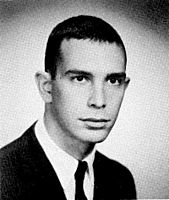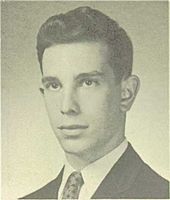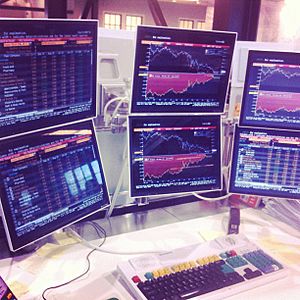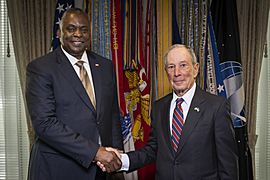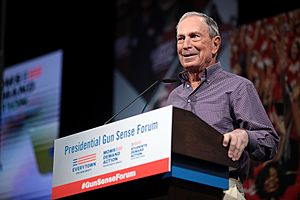Michael Bloomberg facts for kids
Quick facts for kids
Michael Bloomberg
|
|
|---|---|
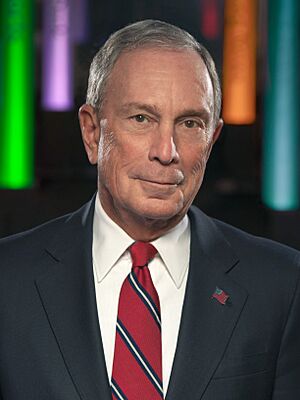
Bloomberg in 2015
|
|
| Chair of the Defense Innovation Board | |
| In office June 22, 2022 – January 14, 2025 |
|
| President | Joe Biden |
| Preceded by | Mark Sirangelo |
| Succeeded by | Vacant |
| 108th Mayor of New York City | |
| In office January 1, 2002 – December 31, 2013 |
|
| Deputy | Patricia Harris |
| Preceded by | Rudy Giuliani |
| Succeeded by | Bill de Blasio |
| Personal details | |
| Born |
Michael Rubens Bloomberg
February 14, 1942 Boston, Massachusetts, U.S. |
| Political party | Democratic (before 2001, 2018–present) Republican (2001–2007) Independent (2007–2018) |
| Spouse |
Susan Brown-Meyer
(m. 1975; div. 1993) |
| Domestic partner | Diana Taylor (2000–present) |
| Children | 2, including Georgina |
| Education | Johns Hopkins University (BS) Harvard University (MBA) |
| Signature | |
Michael Rubens Bloomberg (born February 14, 1942) is an American businessman, politician, and philanthropist. A philanthropist is someone who gives money to help others. He is famous for starting the company Bloomberg L.P. and for serving as the 108th mayor of New York City. He was mayor for three terms, from 2002 to 2013.
Bloomberg is one of the richest people in the world. According to Forbes magazine, his net worth was about $104.7 billion in May 2025. He has signed The Giving Pledge, a promise to give away most of his money to charity. So far, he has donated over $17 billion.
In 2020, he ran for president of the United States. In 2024, President Joe Biden awarded him the Presidential Medal of Freedom, the highest honor for a civilian in the U.S.
Contents
Early Life and Education
Michael Bloomberg was born in Boston, Massachusetts. His father, William, was a bookkeeper for a dairy company, and his mother was Charlotte. His family is Jewish. He grew up in the town of Medford, Massachusetts.
When he was twelve years old, Bloomberg became an Eagle Scout, which is the highest rank in the Boy Scouts. After high school, he went to Johns Hopkins University and earned a degree in electrical engineering. He then went to Harvard Business School to get a Master of Business Administration (MBA) degree.
-
Bloomberg in Johns Hopkins University's 1964 yearbook
Business Career
In 1966, Bloomberg began working at Salomon Brothers, a large investment bank on Wall Street. He was good at his job and became a partner in the company. In 1981, a new company bought Salomon Brothers, and Bloomberg was let go. He received $10 million from the company.
Using this money, Bloomberg started his own company called Innovative Market Systems. He had a big idea: he believed that Wall Street companies would pay for fast, high-quality business information delivered on computer screens. His company created a special computer terminal, now known as the Bloomberg Terminal, that gave users real-time market data and financial news.
The company, later renamed Bloomberg L.P., became a huge success. It grew to include Bloomberg News, Bloomberg Radio, and other services. As of 2019, the company employed 20,000 people in many different locations. After serving as mayor, Bloomberg returned to lead his company again.
Political Career
For most of his life, Bloomberg was a member of the Democratic Party. But in 2001, he switched parties to run for mayor of New York City as a Republican. He won the election and took office on January 1, 2002.
Mayor of New York City
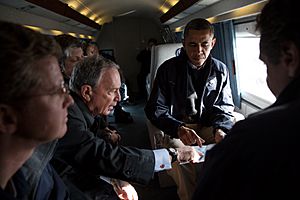
As mayor, Bloomberg was known for using data and statistics to run the city. He made many changes, including:
- Public Health: He passed a ban on smoking in indoor places like restaurants and bars. He also banned unhealthy trans-fat from being used in restaurants.
- City Improvements: He added many new bicycle lanes and made parts of Times Square into plazas where people could walk freely.
- Rebuilding: After the September 11 attacks, his leadership helped rebuild parts of the city and encouraged new construction.
- Education: He worked to reform the city's public schools by creating public charter schools.
Bloomberg was re-elected in 2005. In 2007, he left the Republican Party and became an Independent. New York City had a rule that mayors could only serve two terms. Bloomberg helped change this law, which allowed him to run for a third term. He won the election in 2009 and served as mayor until the end of 2013.
One of his most debated policies was the stop-and-frisk program, which allowed police to stop and search people on the street. Many people felt the program was unfair to certain groups. A court later ruled against how the program was being used. Years later, Bloomberg apologized for supporting it.
2020 Presidential Campaign
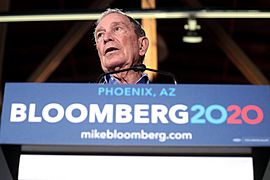
Bloomberg had thought about running for president several times. In November 2019, he officially launched his campaign for the Democratic nomination for the 2020 election. He did not accept donations and instead used his own money, spending a record-breaking amount.
He entered the race late and did not win enough support from voters. He ended his campaign in March 2020 and endorsed Joe Biden.
Defense Innovation Board
In 2022, President Biden chose Bloomberg to be the chair of the Defense Innovation Board. This group gives advice to the U.S. military about new technology.
Philanthropy: Giving Back
Michael Bloomberg is one of the most generous people in the world. Through his foundation, Bloomberg Philanthropies, he has given away more than $17 billion. His donations focus on five main areas: the environment, public health, the arts, government innovation, and education.
Environmental Work
Bloomberg is a strong supporter of fighting climate change. He has given hundreds of millions of dollars to campaigns like Beyond Coal and Beyond Carbon. These programs work to close polluting coal power plants and promote clean energy. He also works with city leaders around the world to help them reduce pollution and protect the environment.
Health and Education
Bloomberg has donated nearly $1 billion to the World Health Organization (WHO) to promote anti-smoking efforts around the world. He also co-founded Everytown for Gun Safety, a group that works to prevent gun violence.
Education is another major focus of his giving. He has given more than $4.5 billion to his old school, Johns Hopkins University. In 2018, he gave the school a gift of $1.8 billion. This money helps the university accept students based on their talent, not on how much money their families have. He has also given large donations to support Black medical schools and students.
Personal Life
In 1975, Bloomberg married Susan Brown. They have two daughters, Emma and Georgina. The couple divorced in 1993, but they have remained friends. Since 2000, Bloomberg's partner has been Diana Taylor.
Awards and Honors
Michael Bloomberg has received many awards for his work in business, government, and philanthropy.
- In 2014, Queen Elizabeth II made him an Honorary Knight Commander of the Order of the British Empire for his work that has helped the United Kingdom.
- In 2024, President Joe Biden awarded him the Presidential Medal of Freedom, the nation's highest honor for a civilian.
- He has also received many honorary degrees from universities like Harvard University, University of Michigan, and Tufts University.
Images for kids
-
Bloomberg with President George W. Bush in 2003
-
Bloomberg with Indian Prime Minister Narendra Modi in 2015
-
Bloomberg speaking at the 2016 Democratic National Convention
See also
 In Spanish: Michael Bloomberg para niños
In Spanish: Michael Bloomberg para niños
- List of Harvard University people
- List of Johns Hopkins University people
- List of people from Boston
- List of philanthropists
- List of richest American politicians
- Timeline of New York City, 2000s–2010s
 | James Van Der Zee |
 | Alma Thomas |
 | Ellis Wilson |
 | Margaret Taylor-Burroughs |


